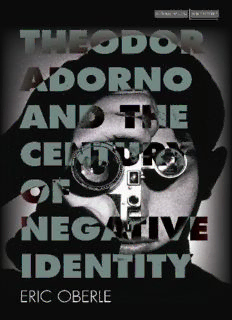
Theodor Adorno and the Century of Negative Identity (Cultural Memory in the Present) PDF
Preview Theodor Adorno and the Century of Negative Identity (Cultural Memory in the Present)
theodor adorno and the century of negative identity This page intentionally left blank Cultural Memory in the Present Hent de Vries, Editor This page intentionally left blank THEODOR ADORNO AND THE CENTURY OF NEGATIVE IDENTITY Eric Oberle stanford university press stanford, california Stanford University Press Stanford, California © 2018 by the Board of Trustees of the Leland Stanford Junior University. All rights reserved. “Jazz, the Wound: Negative Identity, Culture, and the Problem of Weak Subjectivity in Theodor Adorno’s Twentieth Century” was originally published in Modern Intellectual History © 2016, University of Cambridge Press. Reprinted with permission. No part of this book may be reproduced or transmitted in any form or by any means, electronic or mechanical, including photocopying and recording, or in any information storage or retrieval system without the prior written permission of Stanford University Press. Printed in the United States of America on acid-free, archival-quality paper Library of Congress Cataloging-in-Publication Data Names: Oberle, Eric, 1968- author. Title: Theodor Adorno and the century of negative identity / Eric Oberle. Other titles: Cultural memory in the present. Description: Stanford, California : Stanford University Press, 2018. | Series: Cultural memory in the present | Includes bibliographical references and index. Identifiers: LCCN 2017052516 | ISBN 9780804799249 (cloth : alk. paper) | ISBN 9781503606067 (pbk. : alk. paper) | ISBN 9781503606074 (epub) Subjects: LCSH: Adorno, Theodor W., 1903-1969. | Identity (Philosophical concept)—History. | Critical theory—United States—History. Classification: LCC B3199.A34 O24 2018 | DDC 193—dc23 LC record available at https://lccn.loc.gov/2017052516 Typeset by Bruce Lundquist in 11/13.5 Adobe Garamond Contents Acknowledgments ix Introduction 1 1. “Jazz, the Wound”: Negative Identity, Culture, and the Shadow of Race 29 2. America; or, the Stranger 71 3. Negative Identities of the Subject in Wartime America 115 4. Critical Theory Goes to War: The Critique of Positive Identity and Positive Science 131 5. Negative Modeling: Objectivity, Normativity, and the Refusal of the Universal 207 6. Subject/Object and Disciplinarity 241 Conclusion 289 Abbreviations 295 Notes 299 Index 317 This page intentionally left blank Acknowledgments This book was long in the making, and it is suffused with obligation. My sense of indebtedness makes it a privilege and a pleasure to thank every- one who supported and sustained me through many years of struggle and discovery. I thank Stanford professors Keith Baker, Kurt Mueller-Vollmer, Paul Robinson, and James Sheehan, who advised the research out of which this book grew. To Detlev Claussen and Axel Honneth, who mentored me and provided feedback on much earlier stages of this project, I am particu- larly obliged. To Ken Moss, I owe a deep debt of dialogue and friendship. Christine Holbo’s conceptual clarity and tough love for the truth make her my ideal reader. Without Gerald Izenberg this book would not exist; he provided lively and incisive commentary on multiple drafts. This book is dedicated to my parents, Wayne and DeEdra Oberle. I also thank Naomi Andrews, Celia Applegate, Marc Caplan, Charly Coleman, Dan Coleman, Bradin Cormack, Cora Fox, Malachi Hacohen, Espen Hammer, Robert Hullot-Kentor, Jack Jacobs, Martin Jay, Peter-Erwin Jansen, Emily Levine, Thomas Martin, Ian Moulton, Sam Moyn, Anca Parvulescu, Devin Pendas, Ramsey Eric Ramsey, Amy Randall, Noah Strote, K. Stephen Vincent, Michael Werz, and Steven Zwicker. I am grateful as well for the brilliant guidance of Emily-Jane Cohen at Stanford University Press for long sup- port of this project and for the assistance of Jessica Ling, Cynthia Lindlof, and Faith Wilson Stein. I thank Rolf Tiedemann at the Theodor W. Adorno Archive and Jochen Stollberg at the Universitätsbibliothek in Frankfurt. I am grateful to the Stanford Humanities Center and its Fellows for a year of support and discussion. Finally, I express my appreciation to the anony- mous readers at Modern Intellectual History, who provided insightful com- mentary on my “Jazz, the Wound,” published in volume 13, issue 2 (2016), pp. 357–86. Portions of that article have been revised and reproduced here in Chapter 1, with permission from Cambridge University Press. Arizona State University’s Institute for Humanities Research and College of Integrated Sciences and Arts graciously supported publishing this work.
Description: